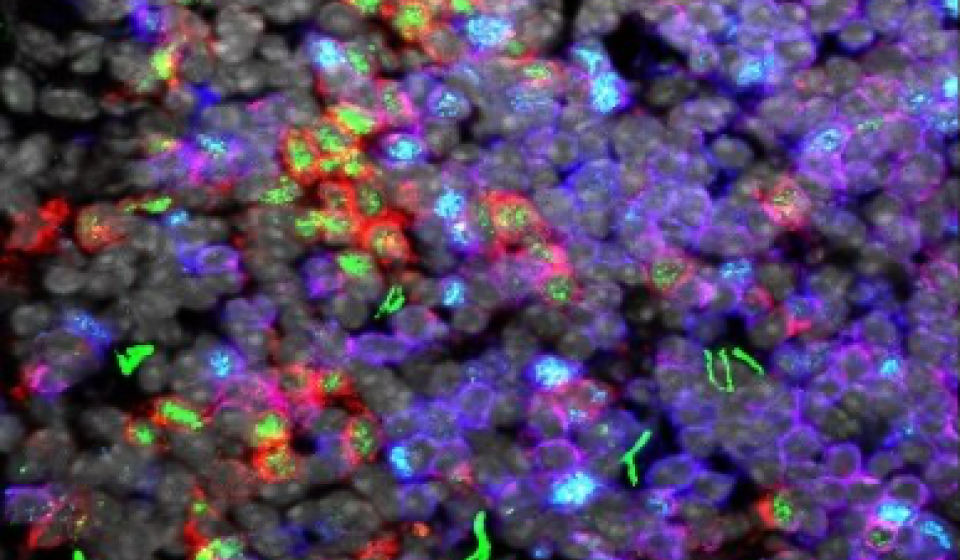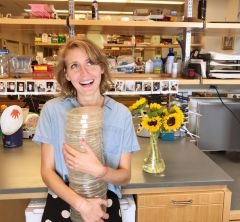Overview
The Ph.D. program in Immunology and Microbial Pathogenesis (IMP) offers cutting-edge training for the next generation of immunologists and microbiologists. Our nearly sixty IMP faculty at Weill Cornell Graduate School and its partner institutions—Weill Cornell Medical College, Memorial Sloan Kettering Cancer Center, and Hospital for Special Surgery—are world-renowned for their work in a broad range of areas, from anti-microbial immunity to the commensal microbiome, molecular to cellular immunology, and autoimmunity to tumor immunology. Students have opportunities to pursue their basic, translational, and clinical research interests in an environment in which the lab and the clinic continually inform one another.
The collective expertise of IMP faculty enables us to build a broad curriculum covering the complexity of immunology and microbial pathogenesis. In the first year, laboratory rotations allow for immersion in research areas of interest. This is complemented by formal classroom learning in immunology, microbiology, and cell biology. Students choose a thesis lab by summer of their first year. Courses in the second year and above are specialized according to student interest and include course work in computational biology or advanced discussion-based classes that delve more deeply into select topics. Additional courses emphasize grant writing to prepare students for their qualifying exam and competing for external fellowships. A large majority of IMP students receive extramural funding support.
Our seminar series hosts world-class scientists each week to discuss the latest ground-breaking research in immunology and microbial pathogenesis. Students present their thesis work in weekly research-in-progress seminars. The annual off-site IMP retreat, attended by fellow students, postdocs, and faculty, provides ample opportunities for poster and oral presentations and networking with IMP faculty. Our diverse scientific interests, rigorous training, and collaborative spirit ensures students are well prepared to tackle important scientific questions, become successful scientists, and contribute to the advancement of knowledge in immunology and microbiology.

Major Areas of Research
| Autoimmunity | Lymphocyte Biology |
| B cell biology | Microbial Pathogenesis |
| Commensal Microbiome | Molecular Immunology |
| Inflammation | T Cell Biology |
| Infectious Disease | Tissue Biology |
| Innate Immunity | Transplantation |
| Immune Development | Tumor Immunology |

Program Requirements
Applicants should have a strong undergraduate background and record of engagement in the biological sciences, including immunology, biochemistry, molecular genetics, and microbiology. Applicants are also expected to have undergraduate laboratory research experience.
An official transcript of the student's undergraduate record is necessary, with three recommendation letters from faculty who can evaluate the academic and research potential of the student in a Ph.D. program in immunology and microbial pathogenesis.
The application requires a personal statement describing the student's background and their specific interest in the Immunology & Microbial Pathogenesis program. Applicants are not required to take the General Graduate Record Examination. Applicants whose native language is not English are required to take the TOEFL examination.
For more information about the application procedures, visit Apply Online.
Path to Degree
An individual program of study, comprising both required and elective course, is developed for each student based on the student's interest and prior experience.
The IMP program places strong emphasis on scholarship. Beginning in the first year with course work in fundamental immunology and complemented by electives in Advanced Immunology courses with flexible topics, an Immunology Seminar Series highlighting the latest developments in the field presented by distinguished scientists, and a student-run “Research in Progress” forum for a critical discussion of thesis research and the open exchange of ideas.
During the first year, each student also undertakes three rotations with different faculty members before choosing a major sponsor with whom to develop a research topic for the doctoral thesis. Each rotation lasts 10-12 weeks, and at the end of each, students present their work at the IMP Rotation Symposium. (Refer to the IMP Student Handbook for deadlines and written requirements associated with lab rotations.)
Each IMP student, with the help of the mentor, must participate regularly in journal clubs throughout the graduate training. He/she may choose elective courses among all courses offered by the other programs of the Graduate School.
The IMP annual retreat is an integral part of the program. This off-site meeting includes formal presentations by faculty, graduate students, and postdoctoral fellows. Graduate students, after admission to candidacy are required to present a poster with senior students giving oral presentations. Prizes are awarded for outstanding talks, posters, and publications.
In the spring of year two, the student will qualify for PhD candidacy by passing the Admission to Doctoral Candidacy Examination (ACE). This proposal-based examination tests the students understanding of their project and the field of immunology and ability to generate and test a hypothesis. This exam requires both written and oral component. When a student passes the ACE, he/she is a candidate for the PhD degree.
Ph.D. Research and Thesis
A Thesis Committee, comprising the major sponsor and two additional faculty members knowledgeable in the field of study advises the student in his or her research, meeting periodically to monitor progress, and to oversee the development of the thesis.
During this time the student continues to participate in the other educational programs offered by the graduate program but works full time in the laboratory.
The culmination of the student’s successful progression through the program is the successful Thesis Defense and certification by the Thesis Committee that the thesis satisfies the requirements of the Graduate School for the Ph.D. degree.





